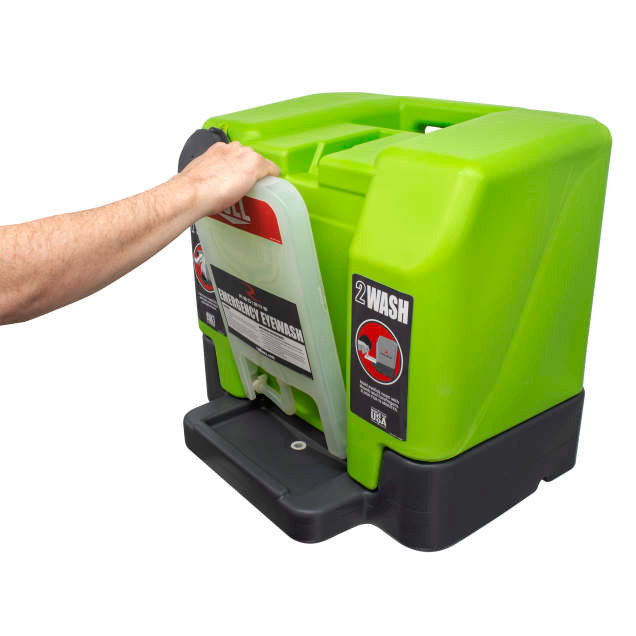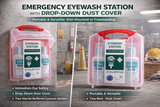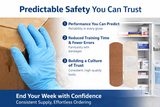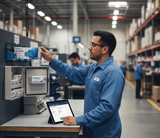The Top 5 Mistakes in Eyewash Station Maintenance (and How to Fix Them)
An emergency eyewash station is a critical piece of safety equipment, but its effectiveness depends entirely on regular maintenance. A malfunctioning or poorly maintained station is often worse than no station at all, as it can create a false sense of security.
Here are the top five most common mistakes in eyewash station maintenance and how to ensure your facility is prepared for any emergency.
Mistake #1: Not Flushing the Unit Weekly
This is the single most common and dangerous oversight. Stagnant water in eyewash pipes can lead to the growth of bacteria and the buildup of sediment, rust, and scale. When activated during an emergency, this debris can be flushed directly into a worker's eyes, causing more harm than good.
How to Fix It: The ANSI Z358.1-2014 standard requires that all plumbed eyewash stations be activated at least weekly. A simple, one-to-three-minute flush is sufficient to clear the line and ensure the water is clean. Keep a log of these weekly activations to maintain a clear record of compliance.
Mistake #2: Having an Inaccessible Eyewash Station
In an emergency, every second counts. An eyewash station that is blocked by a box, a piece of equipment, or is simply hard to reach is completely useless. The ANSI standard states that an eyewash station must be located within a 10-second walk (roughly 55 feet) from the hazard and be on the same level as the hazard.
How to Fix It: Conduct regular walkthroughs of your facility to ensure all paths to emergency equipment are clear and unobstructed. Use highly visible signage and floor markings to clearly indicate the location of the station. Train all employees on the exact location and path to the nearest eyewash unit.
Mistake #3: Ignoring Water Temperature
While you may think "any water is better than no water," water that is too hot or too cold can actually cause further injury. Extremely cold water can shock the eyes, preventing the user from flushing for the full 15 minutes, while water that is too hot can scald the cornea. The ANSI standard specifies that flushing fluid should be "lukewarm," meaning a temperature range of 60°F to 100°F (16°C to 38°C).
How to Fix It: Regularly monitor the water temperature. If your location is prone to extreme temperatures, consider a tempered water system or a heated eyewash station to ensure the water is always within the safe range.
Mistake #4: Not Training Employees on Proper Use
Even a perfectly maintained eyewash station won't work if employees don't know how to use it. Many people are unaware they need to flush for a minimum of 15 minutes and often stop too soon. They may also not know how to properly hold their eyelids open to ensure the water reaches all parts of the eye.
How to Fix It: Implement mandatory, hands-on training for all new and existing employees. Emphasize the importance of the full 15-minute flush and the correct procedure for using the station. Post easy-to-read instructions next to every unit.
Mistake #5: Using an Expired or Poorly Maintained Portable Unit
Portable eyewash stations and personal eyewash bottles are excellent for mobile teams or areas without plumbing, but they have a limited shelf life. The sterile solution can expire, and the tanks can become contaminated if not properly maintained.
How to Fix It: For portable units, follow the manufacturer’s instructions for regular fluid changes. For sealed units and eyewash bottles, check the expiration date monthly. If you are in charge of workplace safety, your checklist should include verifying that all portable units and bottles are full and have not expired.
Conclusion
Proper eyewash station maintenance isn’t just about compliance; it's about protecting your most valuable asset—your employees. By avoiding these common mistakes and establishing a consistent maintenance routine, you can ensure that your workplace is safer and your team is prepared for any emergency.
For high-quality eyewash stations, replacement parts, and other safety solutions, explore our full range of products at yoursafetycompany.com.
Recent Posts
-
The Eyewash Station: Your First Line of Defense in an Eye Emergency
In any workplace, safety should always be a top priority. When it comes to eye safety, every second …2nd Mar 2026 -
The Unsung Hero of Consistency: Why Your Team Trusts the Same Safety Supplies
Imagine trying to bake a cake with a different brand of flour, sugar, and eggs every time. The resul …27th Feb 2026 -
The Hidden Cost of "The Walk": Why Accessible Safety Supplies Matter
In a busy facility, time isn’t just money—it’s momentum. One of the most common "hidden costs" in pr …26th Feb 2026



